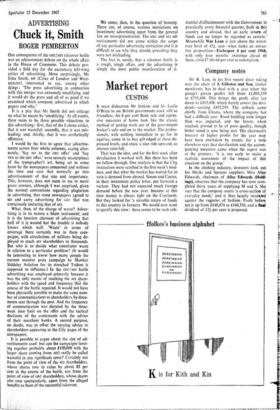Chuck it, Smith
ADVERTISING ROGER PEMBERTON
One consequence of the GEC/AEI takeover battle was an adjournment debate on the whole affair in the House of Commons. This debate pro- vided a field day for the customary ,left-wing critics of advertising. More surprisingly, Mr John Smith, MP (Cities of London and West- minster), •intervened to say, among other things: The press advertising in connection with this merger was extremely unedifying, and it would do the press and all of us good if we examined which company advertised in which papers and why.'
It is a pity that Mr Smith did not enlarge on what he meant by 'unedifying.' At all events, there seem to be three possible objections to this advertising: first, that of the Labour critics, that it was wasteful; secondly, that it was mis- leading; and, thirdly, that it was aesthetically offensive.
I would be the first to agree that advertise- ments across four whole columns, saying alter- nately, 'Say NO to the GEC offer' and 'Say Yes to the GEC offer,' were scarcely masterpieces of the typographer's art, being set in some haste by the newspapers concerned and without the time and care that normally go into advertisements of that size and importance. This, however, does not seem to me to merit grave censure, although I was surprised, given the normal conventions regarding plagiarism in advertising, that some newspapers agreed to set and carry advertising for GEC that was consciously imitating that of AEI.
What, then, of the charge of waste? Adver- tising is in its nature a blunt instrument; and it is the hoariest chestnut of advertising that half of it is wasted but the trouble is nobody knows which half. 'Waste' in terms of Coverage there certainly was in these cam- ' paigns, with circulations of millions being de- ployed to reach AEI shareholders in thousands. But who is to decide what constitutes waste in relation to a particular problem? (It would be interesting to know how many people the current massive press campaign by Hawker Siddeley Aviation for its stretched Trident is Siipposed to influence.) In the GEC/AEI battle 'advertising was employed primarily because it was the only means of reaching the AEI share- holders with the speed and frequency thit the course of the battle required. It would not have been physically possible to make the same num- ber of communications to shareholders by docu- ments sent through the post. And the frequency of communication was dictated by the three- 'Week time limit on the offer and the tactical decisions of the contestants with the advice of their merchant banks. A second purpose, no doubt, was to offset the varying advice to shareholders appearing in the City pages of the newspapers.
It is possible to argue about the size of ad- vertisements used; but can the campaigns (cost- ing together probably about £150,000 with the 'larger share coming from AEI) really be called wasteful in any significant sense? Certainly not from the point of view of the AEI shareholders, whose shares rose in value by about 85 per cent in the course of the battle, nor from the • point of view of GEC shareholders, whose shares also 'rose spectacularly, apart from the alleged benefits to them of the successful takeover. We come, then, to the question of honesty. There are, of course, various restrictions on investment advertising apart from the general law on misrepresentation. The oEc and AEI ad- vertisements did not come within the scope of any particular advertising restriction and it is difficult to see why they should, providing they were not misleading.
The fact is, surely, that a takeover battle is a rough, tough affair, and the advertising is simply the most public manifestation of it.


































 Previous page
Previous page